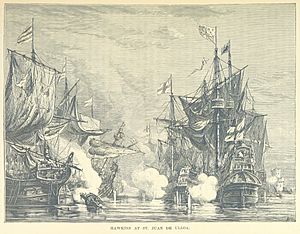José María Coppinger facts for kids
Quick facts for kids
José María Coppinger
|
|
|---|---|
| 8th Governor of Spanish East Florida | |
| In office January 6, 1816 – July 10, 1821 |
|
| Preceded by | Juan José de Estrada |
| Succeeded by | Andrew Jackson as Military Governor of American Florida |
| Personal details | |
| Born | April 5, 1773 Havana, Captaincy General of Cuba, New Spain |
| Died | July 15, 1844 (aged 71) Cárdenas, Cuba |
| Spouses |
Antonia Maria Josefa Crescencia De Saravia
(m. 1797)Narcisa Armenteros Muñoz
(m. 1803) |
| Profession | Brigadier and governor |
José María Coppinger (born April 5, 1773 – died August 15, 1844) was a Spanish soldier. He served in the Royal Spanish Army. He was the governor of East Florida from 1816 to 1821.
Coppinger also governed several areas in Cuba. These included Pinar Del Río, Bayamo, and the Cuatro Villas (four towns). He was a member of important military orders.
Contents
About José María Coppinger
His Family Background
José María Lopez de Gamarra y Coppinger was born in Havana, Cuba. His birthday was April 5, 1773. He was baptized soon after.
His father, Cornelius Coppinger y O'Brien, was from Ireland. He became a Spanish citizen in 1767. The Coppinger family was known for being successful merchants and military officers.
His mother was Cuban. Her family came from Seville, Spain, in the 1600s. Her father was a judge and an accountant for the Royal Treasury.
José María's family was Roman Catholic. He was raised in this faith. He was the second of four sons.
His Military and Governing Career
Coppinger joined the Spanish army when he was young. He became a captain in 1797. He was part of the Regiment of Hibernia.
In 1801, he became a brigadier. He was made military governor of Pinar Del Rio, a large province in Cuba. He also governed the town of Bayamo.
Later, in 1814, he became governor of the Cuatro Villas of Cuba. These towns were Trinidad, Santo Espiritu, Villa Clara, and San Juan de los Remedios.
Governing East Florida
Colonel Coppinger became governor of East Florida on January 6, 1816. He replaced Governor Kindelán. He moved to the capital city, St. Augustine, that same month.
During his time as governor, Coppinger sold some large pieces of land. One was a 16,000-acre timberland area called Sibbald. Another was 200 acres at Sondag's Bluff.
He also organized the Nassau-St. Mary's region. This area was divided into three parts. Each part had its own courts and local militia. This helped keep things running smoothly.
Coppinger remained governor until July 10, 1821. This was when Spain gave Florida to the United States. Coppinger handed over St. Augustine to Colonel Robert Butler. He was the last Spanish governor of the province.
Before this, Coppinger received secret orders. He was told to help the Spanish people in East Florida move. They could go to Cuba, Texas, or Mexico. This was similar to what happened in 1763. Back then, Florida was given to Great Britain.
Coppinger also tried to convince the Seminole chiefs to move their tribes to Texas. He ordered that the U.S. flag be flown next to the Spanish flag.
Later Years and Final Battle
On January 28, 1825, Coppinger took command of the San Juan de Ulúa fortress in Mexico. This was during Spain's attempt to take back Mexico.
Coppinger was the last commander of the fortress. He finally surrendered on November 21, 1825. This happened after many Spanish soldiers became sick with scurvy.
In 1834, Coppinger was appointed governor of Trinidad province in Cuba. He held this job until 1837. He spent his last years in Cuba. He died on August 15, 1844, in Cárdenas.
His Personal Life
José María Coppinger married María Josefa Saravia y Villegas in Havana, Cuba. They married on July 11, 1797. They had four children together. Their names were María de la Trinidad, José María, José Cornelius, and María Antonia.
His second marriage was to Narcisa Armenteros y Muñoz. Coppinger's family members still live in Cuba today. Some also live in Florida.
Images for kids
See also
 In Spanish: José Coppinger para niños
In Spanish: José Coppinger para niños
 | Frances Mary Albrier |
 | Whitney Young |
 | Muhammad Ali |



